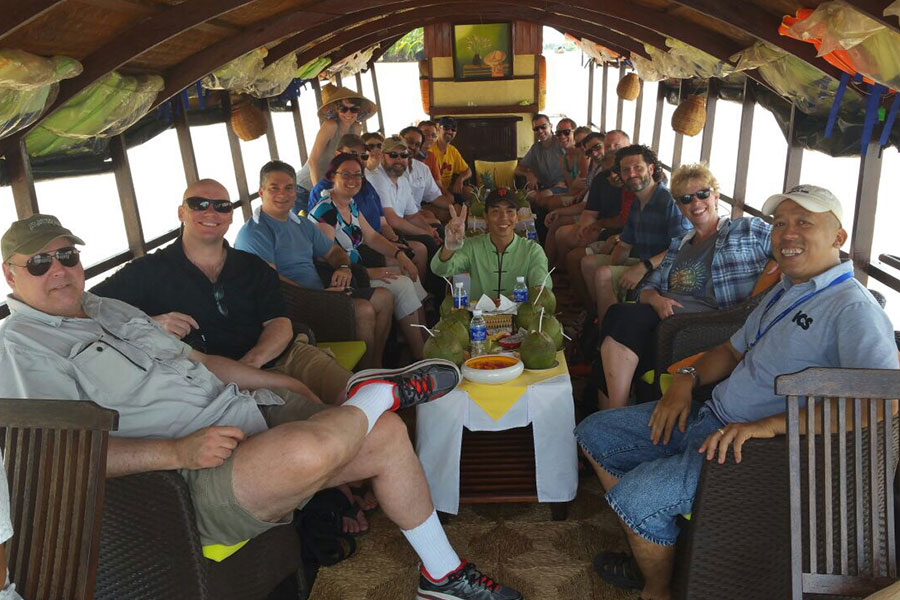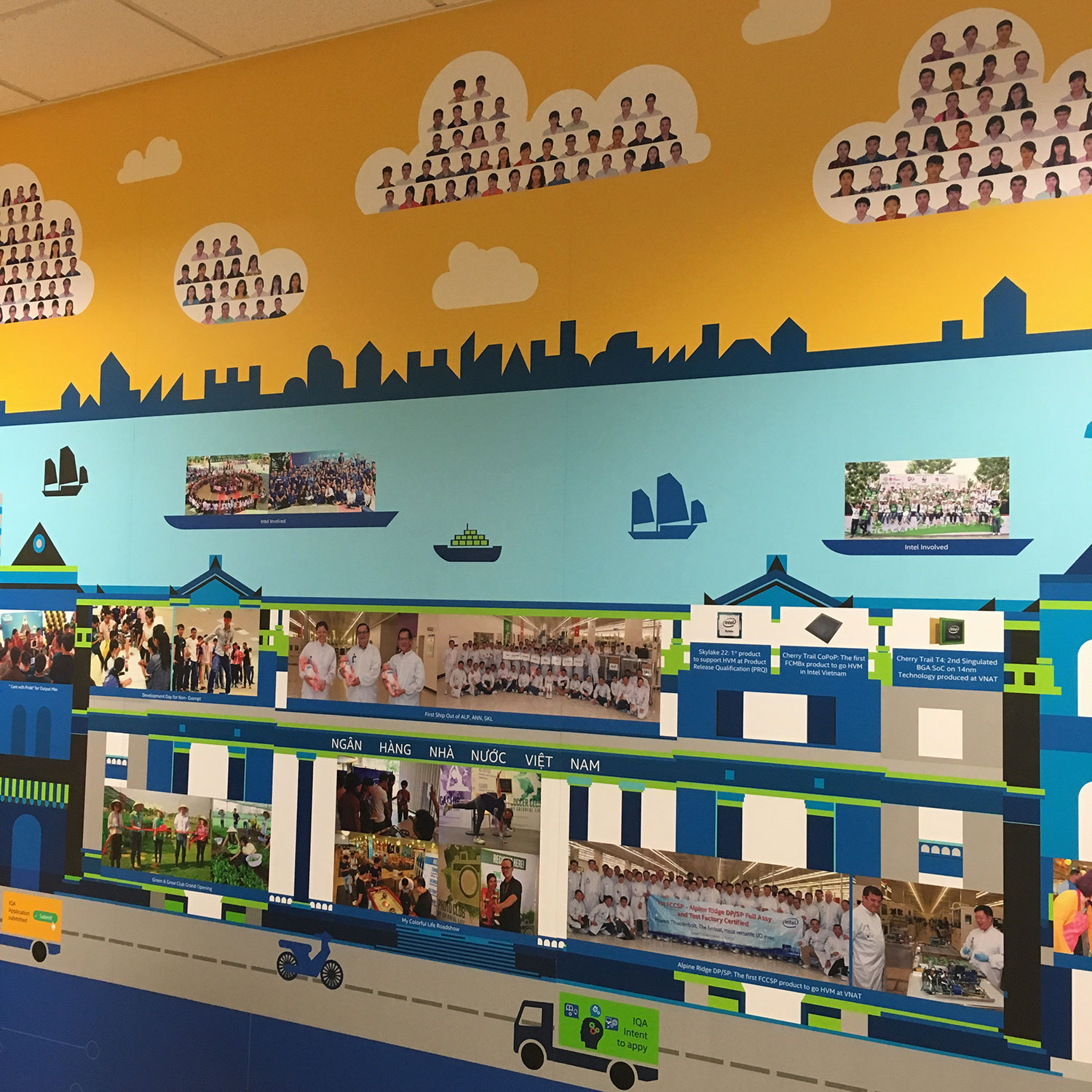EMBA international immersion in Viet Nam: Day 2
Family Medical Practice, Intel Viet Nam, and Politics

After our meetings yesterday, many of us had questions about how politics affected running and growing a business in Viet Nam. But out of respect—and, in all honesty, uncertainty about what we could or could not ask without offending—we erred on the side of caution. It became a topic we talked about amongst ourselves, but not a topic discussed in any detail with the company representatives.
That is…until today. We started the day at Family Medical Practice and then went to Intel Viet Nam.
Family Medical Practice is a primary healthcare business providing family medicine, pediatrics, and emergency medicine services for the different populations groups that reside within their market. The gentleman that greeted us started off sharing stories about the founder that were surreal, like how their business was shut down for a week for an alleged violation of the office furniture permit. Yes, apparently you have to have a permit to have standard office furniture like desks and chairs.
When the founder joined us he was open, funny, and raw. Any and all questions were fair game and he openly offered information about running and growing a business in Viet Nam, and what it’s like to deal with the politics and the corruption. After meeting with various business leaders and interacting with the locals, you develop a new level of appreciation for what we have here, and an awareness of how systemic corruption affects day-to-day life, even for the common person.
If you are successful in Viet Nam, you can be successful anywhere.
As an outsider coming into Viet Nam, he had to relearn everything he thought he knew about growing a business because the laws are open to interpretation and can change based on who is interpreting it that day. The other interesting challenge businesses face is when a law or regulation is changed, unlike in the US where businesses have time to gradually implement it, the change takes effect immediately, which can collapse small businesses or even whole industries! And, most importantly, face is everything. It is more important to always look good and have successes than to have learned from your mistakes. Viet Nam is still “made in Viet Nam” instead of “made by Viet Nam.” There is a big difference between the two.
We heard a story about how they received a violation for their fire escape. On a three story building they installed it so it would give access to people on all three floors. The officials came in and made them move the fire escape to the other side of the building so only one floor would have access to it. That makes sense, right?
In Viet Nam fire and ambulance services are privatized so they have been working towards monopolizing the marketing by bringing in the ambulances and 911 technology. Other doctors request and even pay for patients to be sent to them. But that is the medical field today. “In ten years, the medical industry will be drastically different, moving from a ‘daycare’ approach to more of a revolving door.” We are even starting to see that here in the states.
His overall advice for us: Regulations are written by people; challenge them. And, the line between corruption and in-kind is very fine.
We were all very excited and pumped that we finally had someone tell it to us straight. It also showed us success can be found in spite of the corruption and the socialist government…there will just be more challenges and things will take longer. Regardless of what you think you know, it’s all open for interpretation by whomever is in charge that day.

Intel Viet Nam documents their history including each new hire
After lunch we went over to Intel Viet Nam where we had hoped the open, raw conversations would continue. From initial entrance and even throughout the tour, Intel Viet Nam looked like any tech company in Seattle, from their karaoke room to their game room to their positive quotes on the wall encouraging employees to think outside of the box and that criticism is a complement.
Tobi Crabtree is a part of the North American EMBA program. As the Director of HR Global Employee Support at Intel in Portland, OR I had asked her to share her thoughts on the presentation:
Working in our largest US location, I was interested in seeing how the facility and operations compared in the smaller Vietnam location as well as how the outside community views Intel. I was pleased to see that there was a strong focus on quality and safety and a solid understanding of Intel’s vision and strategy at the Viet Nam location. One of the employees we met with discussed the focus on safety and how Intel works is very different from what he was used to in Viet Nam, but now he embraces it and even finds himself holding the handrail on the stairs outside of Intel! It was also good to see the cultural and personal touches on the site, such as quotes hanging from the ceiling to encourage employees, the cafe serving local food, 95% of employees participating in community service events, and a focus on continuing education for Vietnamese students with a special focus on women in technical roles. While there were small differences that showed the distance from corporate, such as outdated branding on their slides (but we see this in the US as well), the vast majority of the interactions, work, and values align with Intel headquarters and other locations across the globe. As far as the community perceptions, I spoke with another employee who talked about how much Intel does to help the community and that it is very prestigious to have a job at Intel.
Intel Viet Nam is a Phase II manufacturer who takes great pride in the many ways that they give back to the community. They have an elaborate education program that allows students to do the final two years of college in the United States and then return to Viet Nam to work. They are currently in the third cohort going through this program. The first year, there were no women, the second had a few and the third year is almost half women, which is a huge success and great source of pride for them.
Beyond their education programs they shared about their community work, LEED certified facility, how they’re largest operating solar power system in Viet Nam, and 100% of their water is reclaimed. Beyond their community efforts, it didn’t seem that Intel Vietnam was willing to share much if anything about the act of doing or growing a business in Viet Nam.
Guest post by Melanie DePaoli
Speaker | Brand Catalyst, Omicle LLC
Follow Melanie on Twitter: @MelDePaoli
